Essay: Roles, Responsibilities, and Skills of a Professional Nurse
VerifiedAdded on 2020/10/05
|10
|2130
|311
Essay
AI Summary
This essay delves into the multifaceted roles and responsibilities of professional nurses and midwives, emphasizing the importance of clinical and non-clinical skills in delivering quality patient care. The essay analyzes the transition from student to professional, highlighting the significance of transition programs and the acquisition of expertise through experience and guidance. It discusses the critical importance of both clinical skills, such as accurate medication administration, and non-clinical skills, including communication, decision-making, and clinical judgment. The essay references Benner's stages of skill acquisition, from novice to expert, and emphasizes the importance of teamwork, professional appearance, and patient feedback. The reflection section offers personal insights into the challenges and rewards of nursing, and the conclusion underscores the vital role nurses and midwives play in the healthcare sector, advocating for continuous professional development and the honing of leadership and communication skills. The essay uses a variety of sources, including books, journals and online resources to support its arguments.
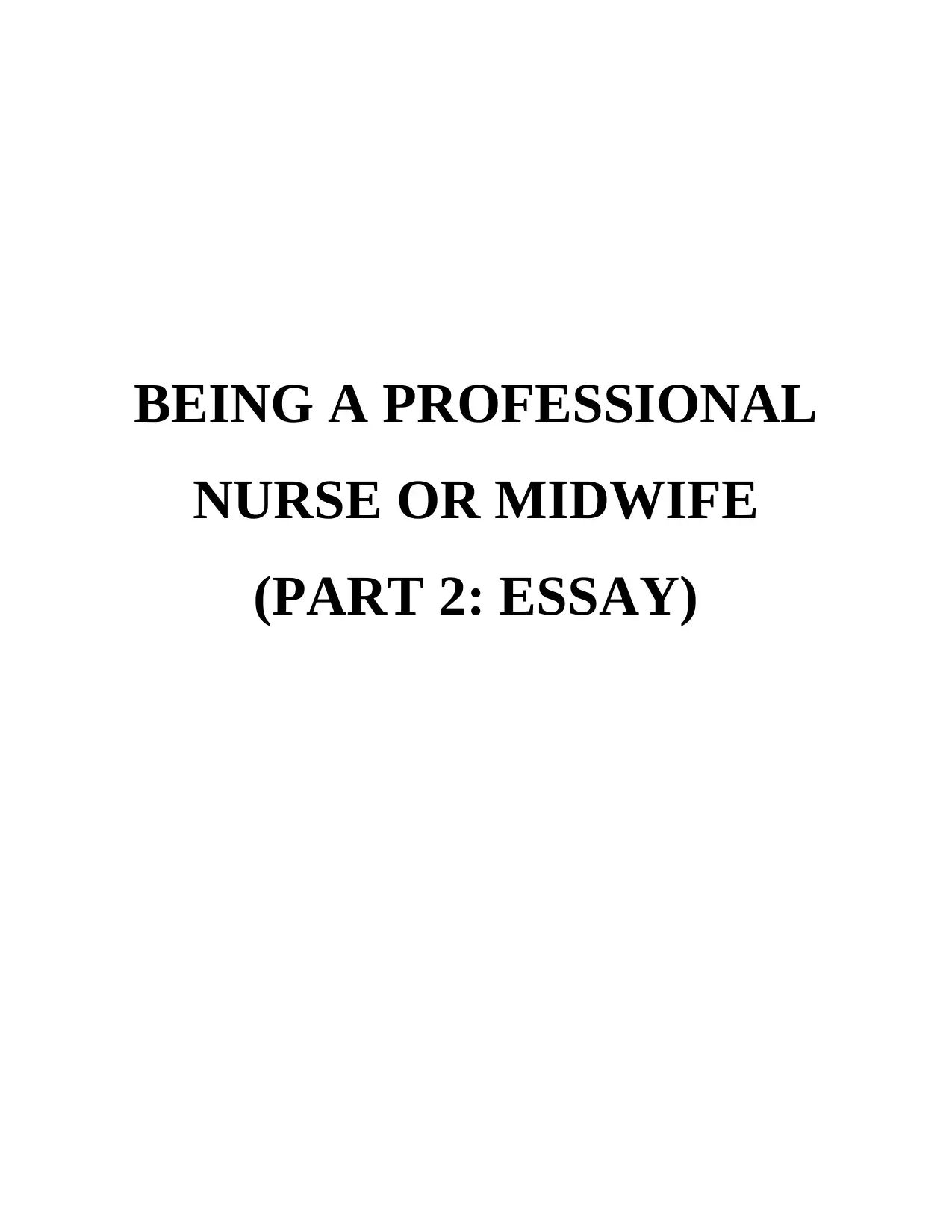
BEING A PROFESSIONAL
NURSE OR MIDWIFE
(PART 2: ESSAY)
NURSE OR MIDWIFE
(PART 2: ESSAY)
Paraphrase This Document
Need a fresh take? Get an instant paraphrase of this document with our AI Paraphraser
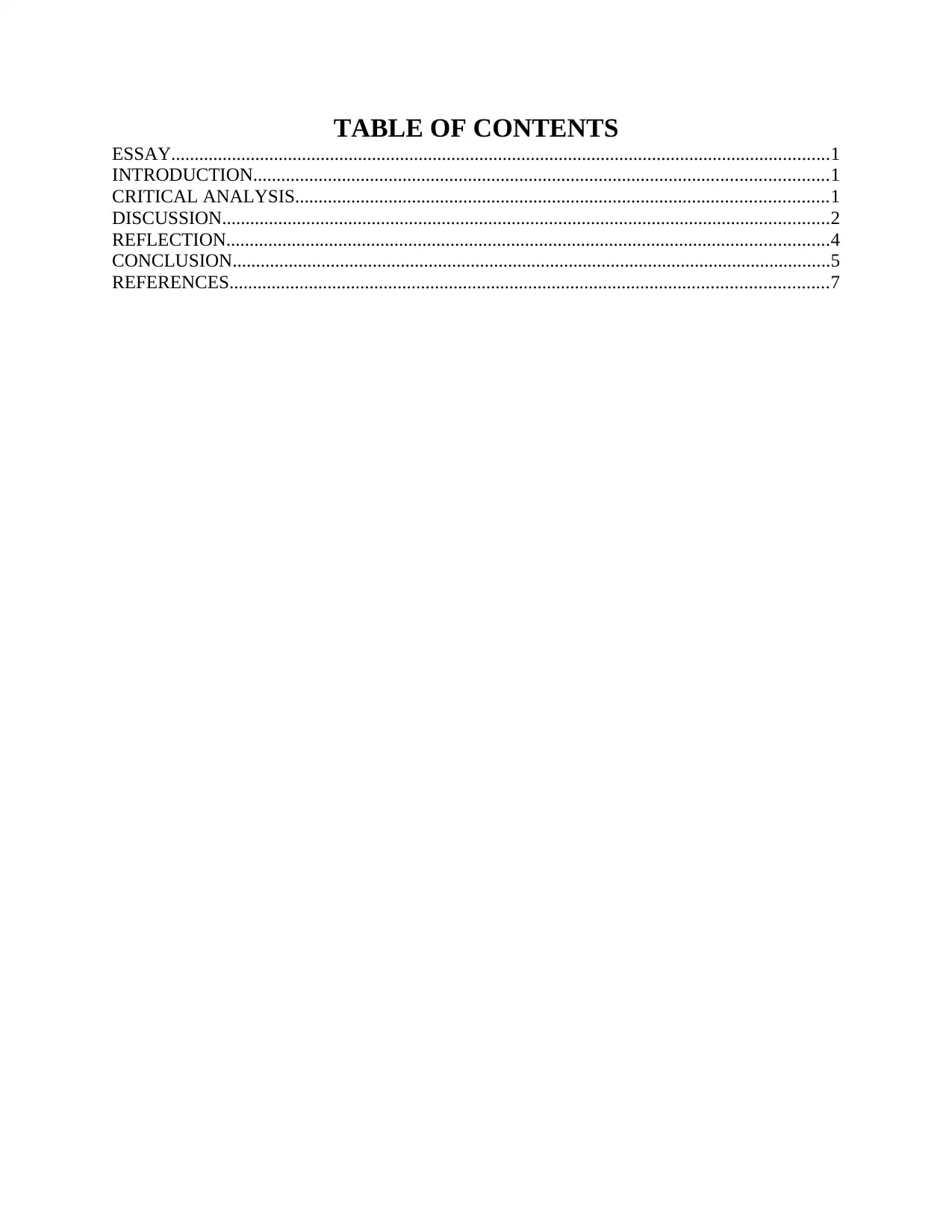
TABLE OF CONTENTS
ESSAY.............................................................................................................................................1
INTRODUCTION...........................................................................................................................1
CRITICAL ANALYSIS..................................................................................................................1
DISCUSSION..................................................................................................................................2
REFLECTION.................................................................................................................................4
CONCLUSION................................................................................................................................5
REFERENCES................................................................................................................................7
ESSAY.............................................................................................................................................1
INTRODUCTION...........................................................................................................................1
CRITICAL ANALYSIS..................................................................................................................1
DISCUSSION..................................................................................................................................2
REFLECTION.................................................................................................................................4
CONCLUSION................................................................................................................................5
REFERENCES................................................................................................................................7
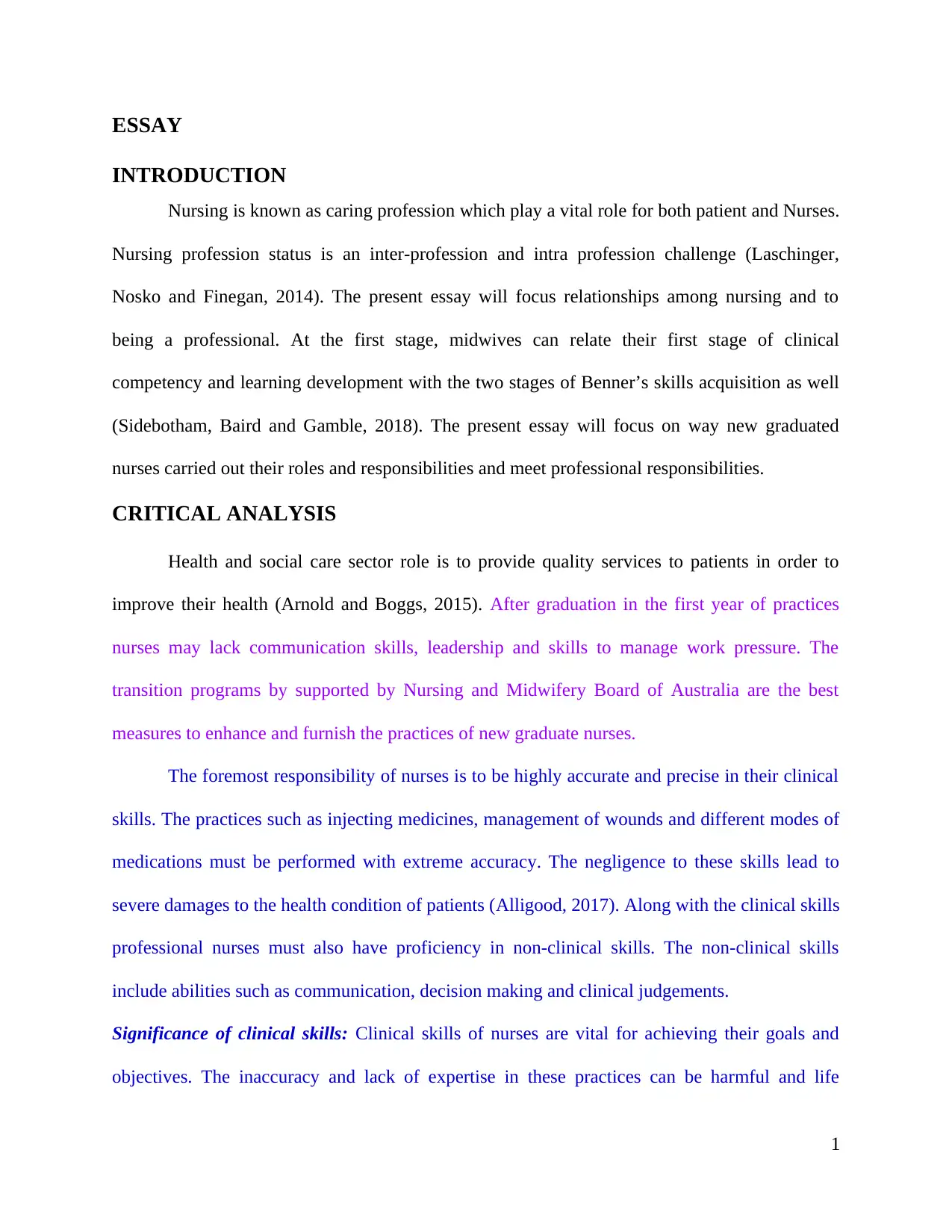
ESSAY
INTRODUCTION
Nursing is known as caring profession which play a vital role for both patient and Nurses.
Nursing profession status is an inter-profession and intra profession challenge (Laschinger,
Nosko and Finegan, 2014). The present essay will focus relationships among nursing and to
being a professional. At the first stage, midwives can relate their first stage of clinical
competency and learning development with the two stages of Benner’s skills acquisition as well
(Sidebotham, Baird and Gamble, 2018). The present essay will focus on way new graduated
nurses carried out their roles and responsibilities and meet professional responsibilities.
CRITICAL ANALYSIS
Health and social care sector role is to provide quality services to patients in order to
improve their health (Arnold and Boggs, 2015). After graduation in the first year of practices
nurses may lack communication skills, leadership and skills to manage work pressure. The
transition programs by supported by Nursing and Midwifery Board of Australia are the best
measures to enhance and furnish the practices of new graduate nurses.
The foremost responsibility of nurses is to be highly accurate and precise in their clinical
skills. The practices such as injecting medicines, management of wounds and different modes of
medications must be performed with extreme accuracy. The negligence to these skills lead to
severe damages to the health condition of patients (Alligood, 2017). Along with the clinical skills
professional nurses must also have proficiency in non-clinical skills. The non-clinical skills
include abilities such as communication, decision making and clinical judgements.
Significance of clinical skills: Clinical skills of nurses are vital for achieving their goals and
objectives. The inaccuracy and lack of expertise in these practices can be harmful and life
1
INTRODUCTION
Nursing is known as caring profession which play a vital role for both patient and Nurses.
Nursing profession status is an inter-profession and intra profession challenge (Laschinger,
Nosko and Finegan, 2014). The present essay will focus relationships among nursing and to
being a professional. At the first stage, midwives can relate their first stage of clinical
competency and learning development with the two stages of Benner’s skills acquisition as well
(Sidebotham, Baird and Gamble, 2018). The present essay will focus on way new graduated
nurses carried out their roles and responsibilities and meet professional responsibilities.
CRITICAL ANALYSIS
Health and social care sector role is to provide quality services to patients in order to
improve their health (Arnold and Boggs, 2015). After graduation in the first year of practices
nurses may lack communication skills, leadership and skills to manage work pressure. The
transition programs by supported by Nursing and Midwifery Board of Australia are the best
measures to enhance and furnish the practices of new graduate nurses.
The foremost responsibility of nurses is to be highly accurate and precise in their clinical
skills. The practices such as injecting medicines, management of wounds and different modes of
medications must be performed with extreme accuracy. The negligence to these skills lead to
severe damages to the health condition of patients (Alligood, 2017). Along with the clinical skills
professional nurses must also have proficiency in non-clinical skills. The non-clinical skills
include abilities such as communication, decision making and clinical judgements.
Significance of clinical skills: Clinical skills of nurses are vital for achieving their goals and
objectives. The inaccuracy and lack of expertise in these practices can be harmful and life
1
⊘ This is a preview!⊘
Do you want full access?
Subscribe today to unlock all pages.

Trusted by 1+ million students worldwide
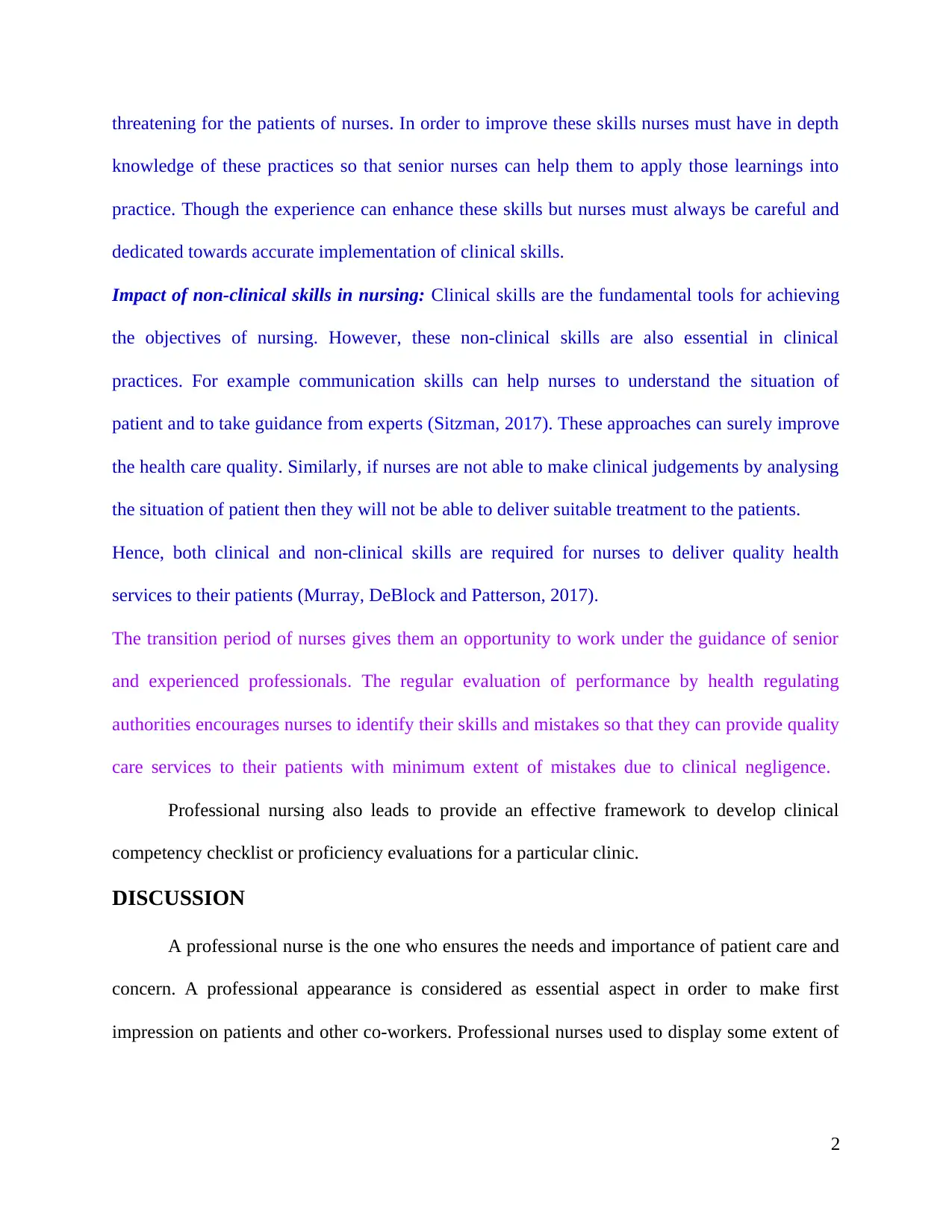
threatening for the patients of nurses. In order to improve these skills nurses must have in depth
knowledge of these practices so that senior nurses can help them to apply those learnings into
practice. Though the experience can enhance these skills but nurses must always be careful and
dedicated towards accurate implementation of clinical skills.
Impact of non-clinical skills in nursing: Clinical skills are the fundamental tools for achieving
the objectives of nursing. However, these non-clinical skills are also essential in clinical
practices. For example communication skills can help nurses to understand the situation of
patient and to take guidance from experts (Sitzman, 2017). These approaches can surely improve
the health care quality. Similarly, if nurses are not able to make clinical judgements by analysing
the situation of patient then they will not be able to deliver suitable treatment to the patients.
Hence, both clinical and non-clinical skills are required for nurses to deliver quality health
services to their patients (Murray, DeBlock and Patterson, 2017).
The transition period of nurses gives them an opportunity to work under the guidance of senior
and experienced professionals. The regular evaluation of performance by health regulating
authorities encourages nurses to identify their skills and mistakes so that they can provide quality
care services to their patients with minimum extent of mistakes due to clinical negligence.
Professional nursing also leads to provide an effective framework to develop clinical
competency checklist or proficiency evaluations for a particular clinic.
DISCUSSION
A professional nurse is the one who ensures the needs and importance of patient care and
concern. A professional appearance is considered as essential aspect in order to make first
impression on patients and other co-workers. Professional nurses used to display some extent of
2
knowledge of these practices so that senior nurses can help them to apply those learnings into
practice. Though the experience can enhance these skills but nurses must always be careful and
dedicated towards accurate implementation of clinical skills.
Impact of non-clinical skills in nursing: Clinical skills are the fundamental tools for achieving
the objectives of nursing. However, these non-clinical skills are also essential in clinical
practices. For example communication skills can help nurses to understand the situation of
patient and to take guidance from experts (Sitzman, 2017). These approaches can surely improve
the health care quality. Similarly, if nurses are not able to make clinical judgements by analysing
the situation of patient then they will not be able to deliver suitable treatment to the patients.
Hence, both clinical and non-clinical skills are required for nurses to deliver quality health
services to their patients (Murray, DeBlock and Patterson, 2017).
The transition period of nurses gives them an opportunity to work under the guidance of senior
and experienced professionals. The regular evaluation of performance by health regulating
authorities encourages nurses to identify their skills and mistakes so that they can provide quality
care services to their patients with minimum extent of mistakes due to clinical negligence.
Professional nursing also leads to provide an effective framework to develop clinical
competency checklist or proficiency evaluations for a particular clinic.
DISCUSSION
A professional nurse is the one who ensures the needs and importance of patient care and
concern. A professional appearance is considered as essential aspect in order to make first
impression on patients and other co-workers. Professional nurses used to display some extent of
2
Paraphrase This Document
Need a fresh take? Get an instant paraphrase of this document with our AI Paraphraser
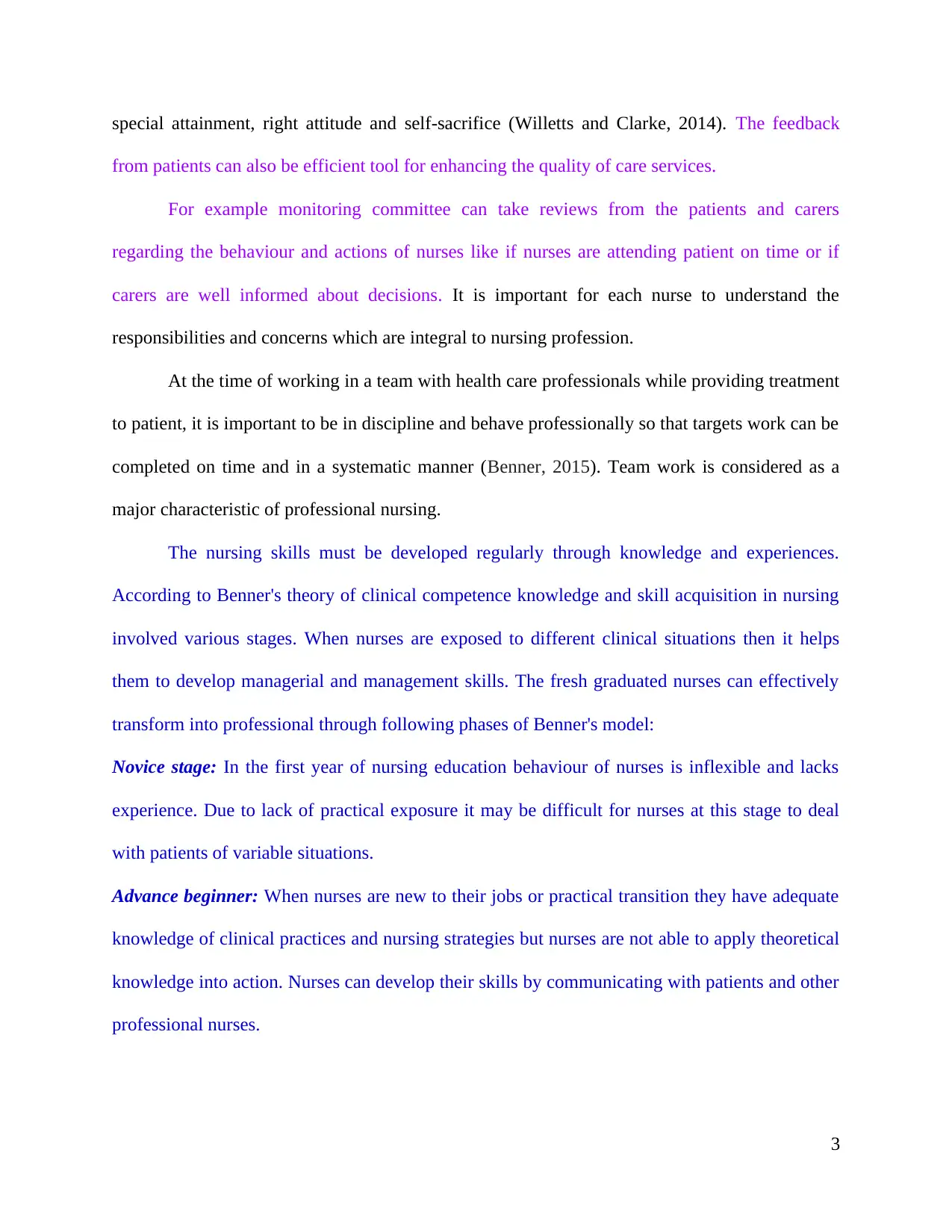
special attainment, right attitude and self-sacrifice (Willetts and Clarke, 2014). The feedback
from patients can also be efficient tool for enhancing the quality of care services.
For example monitoring committee can take reviews from the patients and carers
regarding the behaviour and actions of nurses like if nurses are attending patient on time or if
carers are well informed about decisions. It is important for each nurse to understand the
responsibilities and concerns which are integral to nursing profession.
At the time of working in a team with health care professionals while providing treatment
to patient, it is important to be in discipline and behave professionally so that targets work can be
completed on time and in a systematic manner (Benner, 2015). Team work is considered as a
major characteristic of professional nursing.
The nursing skills must be developed regularly through knowledge and experiences.
According to Benner's theory of clinical competence knowledge and skill acquisition in nursing
involved various stages. When nurses are exposed to different clinical situations then it helps
them to develop managerial and management skills. The fresh graduated nurses can effectively
transform into professional through following phases of Benner's model:
Novice stage: In the first year of nursing education behaviour of nurses is inflexible and lacks
experience. Due to lack of practical exposure it may be difficult for nurses at this stage to deal
with patients of variable situations.
Advance beginner: When nurses are new to their jobs or practical transition they have adequate
knowledge of clinical practices and nursing strategies but nurses are not able to apply theoretical
knowledge into action. Nurses can develop their skills by communicating with patients and other
professional nurses.
3
from patients can also be efficient tool for enhancing the quality of care services.
For example monitoring committee can take reviews from the patients and carers
regarding the behaviour and actions of nurses like if nurses are attending patient on time or if
carers are well informed about decisions. It is important for each nurse to understand the
responsibilities and concerns which are integral to nursing profession.
At the time of working in a team with health care professionals while providing treatment
to patient, it is important to be in discipline and behave professionally so that targets work can be
completed on time and in a systematic manner (Benner, 2015). Team work is considered as a
major characteristic of professional nursing.
The nursing skills must be developed regularly through knowledge and experiences.
According to Benner's theory of clinical competence knowledge and skill acquisition in nursing
involved various stages. When nurses are exposed to different clinical situations then it helps
them to develop managerial and management skills. The fresh graduated nurses can effectively
transform into professional through following phases of Benner's model:
Novice stage: In the first year of nursing education behaviour of nurses is inflexible and lacks
experience. Due to lack of practical exposure it may be difficult for nurses at this stage to deal
with patients of variable situations.
Advance beginner: When nurses are new to their jobs or practical transition they have adequate
knowledge of clinical practices and nursing strategies but nurses are not able to apply theoretical
knowledge into action. Nurses can develop their skills by communicating with patients and other
professional nurses.
3
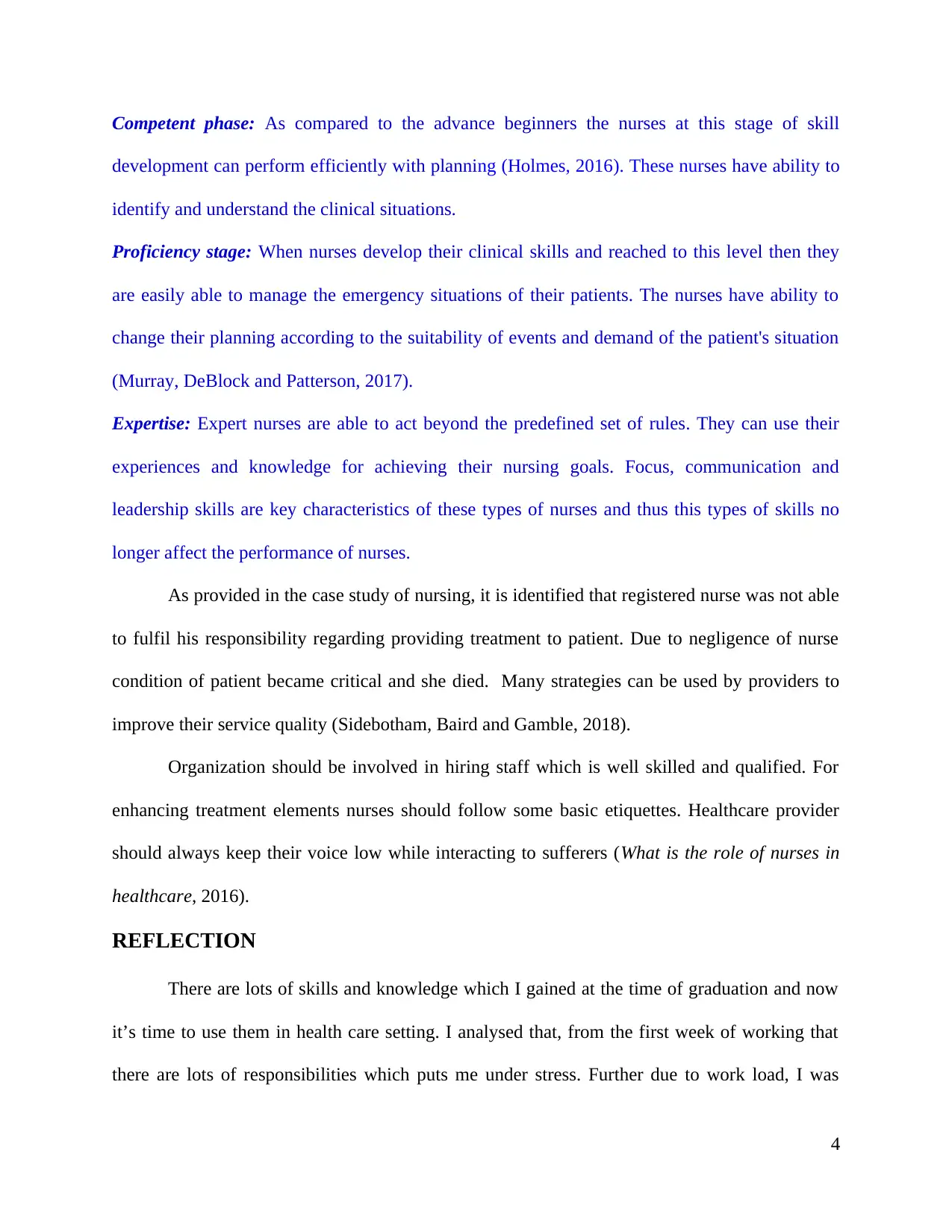
Competent phase: As compared to the advance beginners the nurses at this stage of skill
development can perform efficiently with planning (Holmes, 2016). These nurses have ability to
identify and understand the clinical situations.
Proficiency stage: When nurses develop their clinical skills and reached to this level then they
are easily able to manage the emergency situations of their patients. The nurses have ability to
change their planning according to the suitability of events and demand of the patient's situation
(Murray, DeBlock and Patterson, 2017).
Expertise: Expert nurses are able to act beyond the predefined set of rules. They can use their
experiences and knowledge for achieving their nursing goals. Focus, communication and
leadership skills are key characteristics of these types of nurses and thus this types of skills no
longer affect the performance of nurses.
As provided in the case study of nursing, it is identified that registered nurse was not able
to fulfil his responsibility regarding providing treatment to patient. Due to negligence of nurse
condition of patient became critical and she died. Many strategies can be used by providers to
improve their service quality (Sidebotham, Baird and Gamble, 2018).
Organization should be involved in hiring staff which is well skilled and qualified. For
enhancing treatment elements nurses should follow some basic etiquettes. Healthcare provider
should always keep their voice low while interacting to sufferers (What is the role of nurses in
healthcare, 2016).
REFLECTION
There are lots of skills and knowledge which I gained at the time of graduation and now
it’s time to use them in health care setting. I analysed that, from the first week of working that
there are lots of responsibilities which puts me under stress. Further due to work load, I was
4
development can perform efficiently with planning (Holmes, 2016). These nurses have ability to
identify and understand the clinical situations.
Proficiency stage: When nurses develop their clinical skills and reached to this level then they
are easily able to manage the emergency situations of their patients. The nurses have ability to
change their planning according to the suitability of events and demand of the patient's situation
(Murray, DeBlock and Patterson, 2017).
Expertise: Expert nurses are able to act beyond the predefined set of rules. They can use their
experiences and knowledge for achieving their nursing goals. Focus, communication and
leadership skills are key characteristics of these types of nurses and thus this types of skills no
longer affect the performance of nurses.
As provided in the case study of nursing, it is identified that registered nurse was not able
to fulfil his responsibility regarding providing treatment to patient. Due to negligence of nurse
condition of patient became critical and she died. Many strategies can be used by providers to
improve their service quality (Sidebotham, Baird and Gamble, 2018).
Organization should be involved in hiring staff which is well skilled and qualified. For
enhancing treatment elements nurses should follow some basic etiquettes. Healthcare provider
should always keep their voice low while interacting to sufferers (What is the role of nurses in
healthcare, 2016).
REFLECTION
There are lots of skills and knowledge which I gained at the time of graduation and now
it’s time to use them in health care setting. I analysed that, from the first week of working that
there are lots of responsibilities which puts me under stress. Further due to work load, I was
4
⊘ This is a preview!⊘
Do you want full access?
Subscribe today to unlock all pages.

Trusted by 1+ million students worldwide
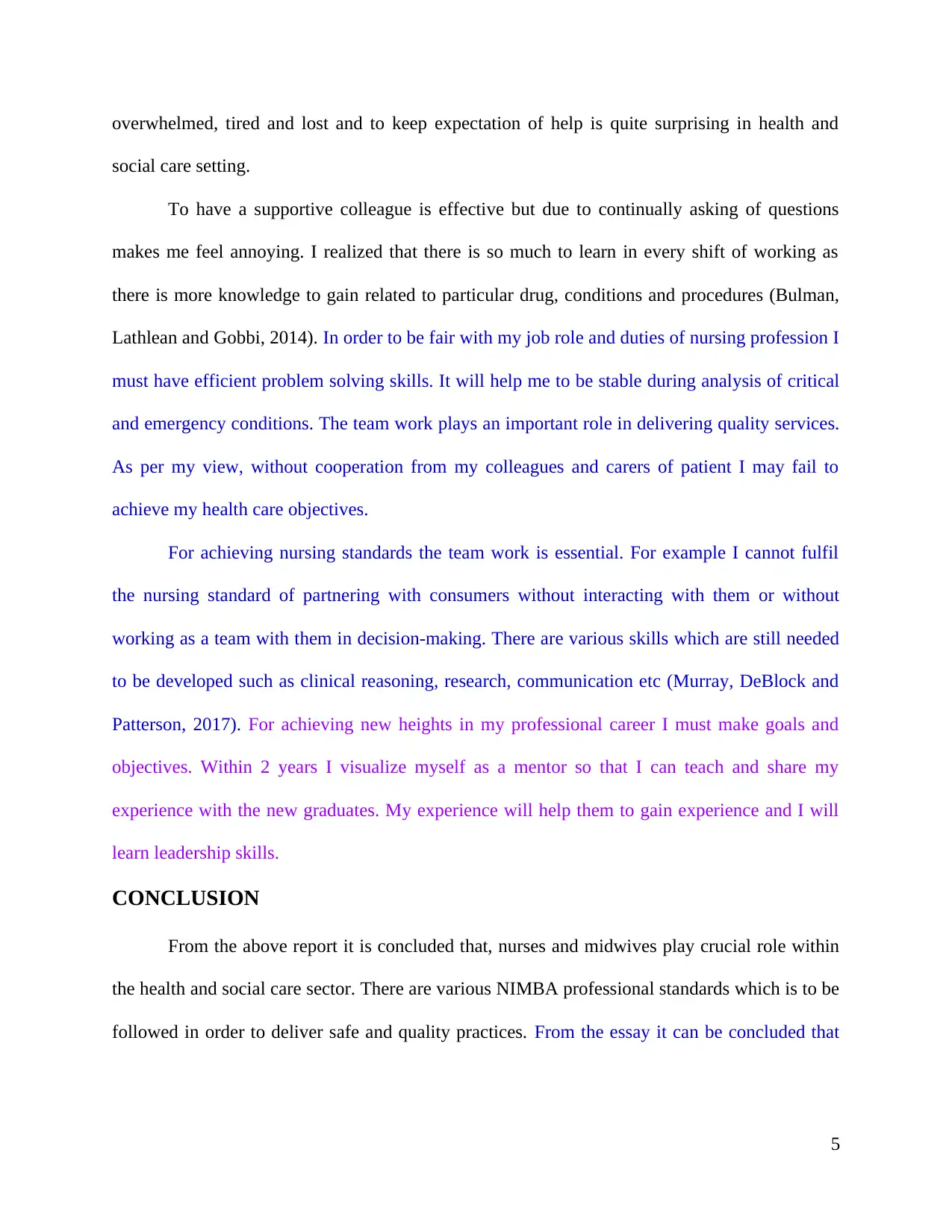
overwhelmed, tired and lost and to keep expectation of help is quite surprising in health and
social care setting.
To have a supportive colleague is effective but due to continually asking of questions
makes me feel annoying. I realized that there is so much to learn in every shift of working as
there is more knowledge to gain related to particular drug, conditions and procedures (Bulman,
Lathlean and Gobbi, 2014). In order to be fair with my job role and duties of nursing profession I
must have efficient problem solving skills. It will help me to be stable during analysis of critical
and emergency conditions. The team work plays an important role in delivering quality services.
As per my view, without cooperation from my colleagues and carers of patient I may fail to
achieve my health care objectives.
For achieving nursing standards the team work is essential. For example I cannot fulfil
the nursing standard of partnering with consumers without interacting with them or without
working as a team with them in decision-making. There are various skills which are still needed
to be developed such as clinical reasoning, research, communication etc (Murray, DeBlock and
Patterson, 2017). For achieving new heights in my professional career I must make goals and
objectives. Within 2 years I visualize myself as a mentor so that I can teach and share my
experience with the new graduates. My experience will help them to gain experience and I will
learn leadership skills.
CONCLUSION
From the above report it is concluded that, nurses and midwives play crucial role within
the health and social care sector. There are various NIMBA professional standards which is to be
followed in order to deliver safe and quality practices. From the essay it can be concluded that
5
social care setting.
To have a supportive colleague is effective but due to continually asking of questions
makes me feel annoying. I realized that there is so much to learn in every shift of working as
there is more knowledge to gain related to particular drug, conditions and procedures (Bulman,
Lathlean and Gobbi, 2014). In order to be fair with my job role and duties of nursing profession I
must have efficient problem solving skills. It will help me to be stable during analysis of critical
and emergency conditions. The team work plays an important role in delivering quality services.
As per my view, without cooperation from my colleagues and carers of patient I may fail to
achieve my health care objectives.
For achieving nursing standards the team work is essential. For example I cannot fulfil
the nursing standard of partnering with consumers without interacting with them or without
working as a team with them in decision-making. There are various skills which are still needed
to be developed such as clinical reasoning, research, communication etc (Murray, DeBlock and
Patterson, 2017). For achieving new heights in my professional career I must make goals and
objectives. Within 2 years I visualize myself as a mentor so that I can teach and share my
experience with the new graduates. My experience will help them to gain experience and I will
learn leadership skills.
CONCLUSION
From the above report it is concluded that, nurses and midwives play crucial role within
the health and social care sector. There are various NIMBA professional standards which is to be
followed in order to deliver safe and quality practices. From the essay it can be concluded that
5
Paraphrase This Document
Need a fresh take? Get an instant paraphrase of this document with our AI Paraphraser
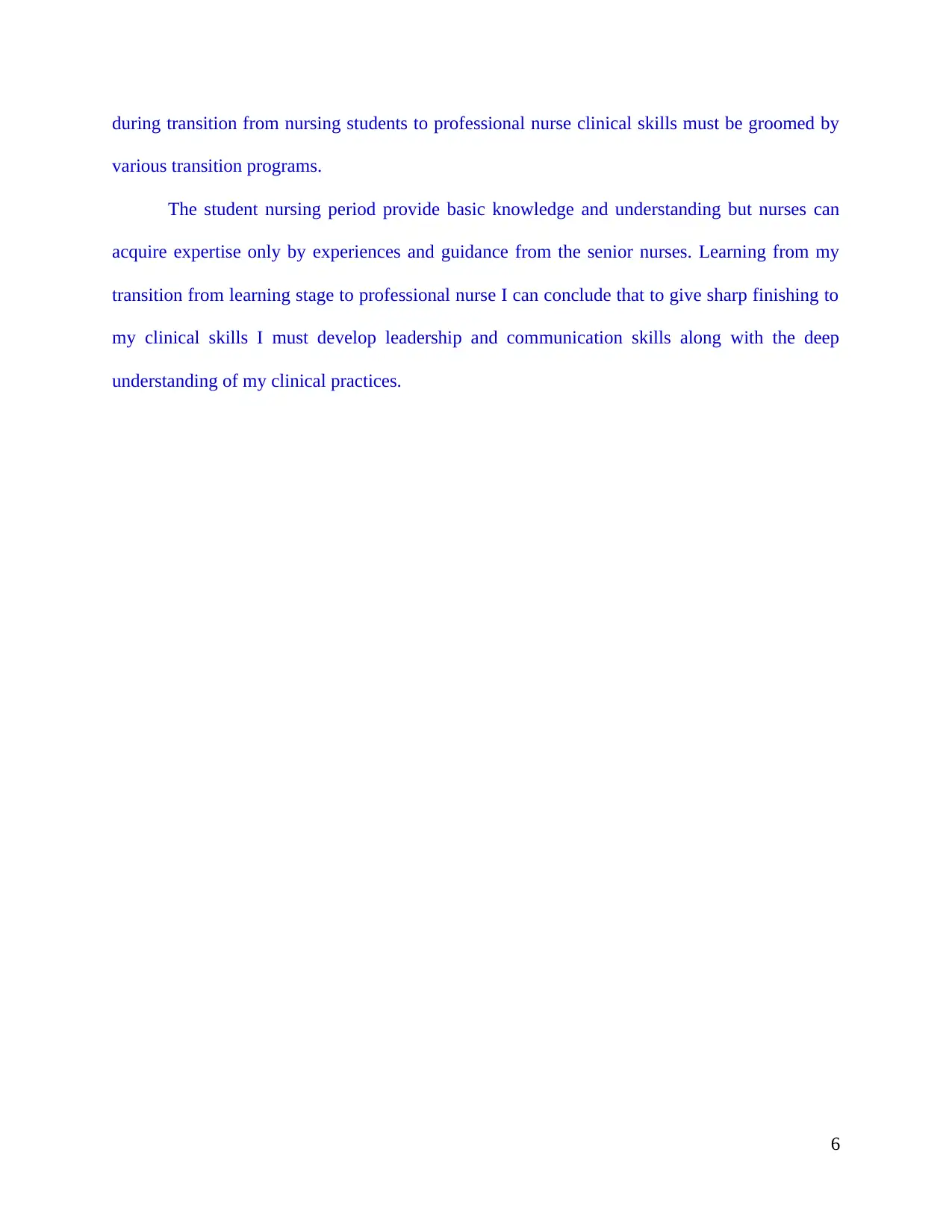
during transition from nursing students to professional nurse clinical skills must be groomed by
various transition programs.
The student nursing period provide basic knowledge and understanding but nurses can
acquire expertise only by experiences and guidance from the senior nurses. Learning from my
transition from learning stage to professional nurse I can conclude that to give sharp finishing to
my clinical skills I must develop leadership and communication skills along with the deep
understanding of my clinical practices.
6
various transition programs.
The student nursing period provide basic knowledge and understanding but nurses can
acquire expertise only by experiences and guidance from the senior nurses. Learning from my
transition from learning stage to professional nurse I can conclude that to give sharp finishing to
my clinical skills I must develop leadership and communication skills along with the deep
understanding of my clinical practices.
6
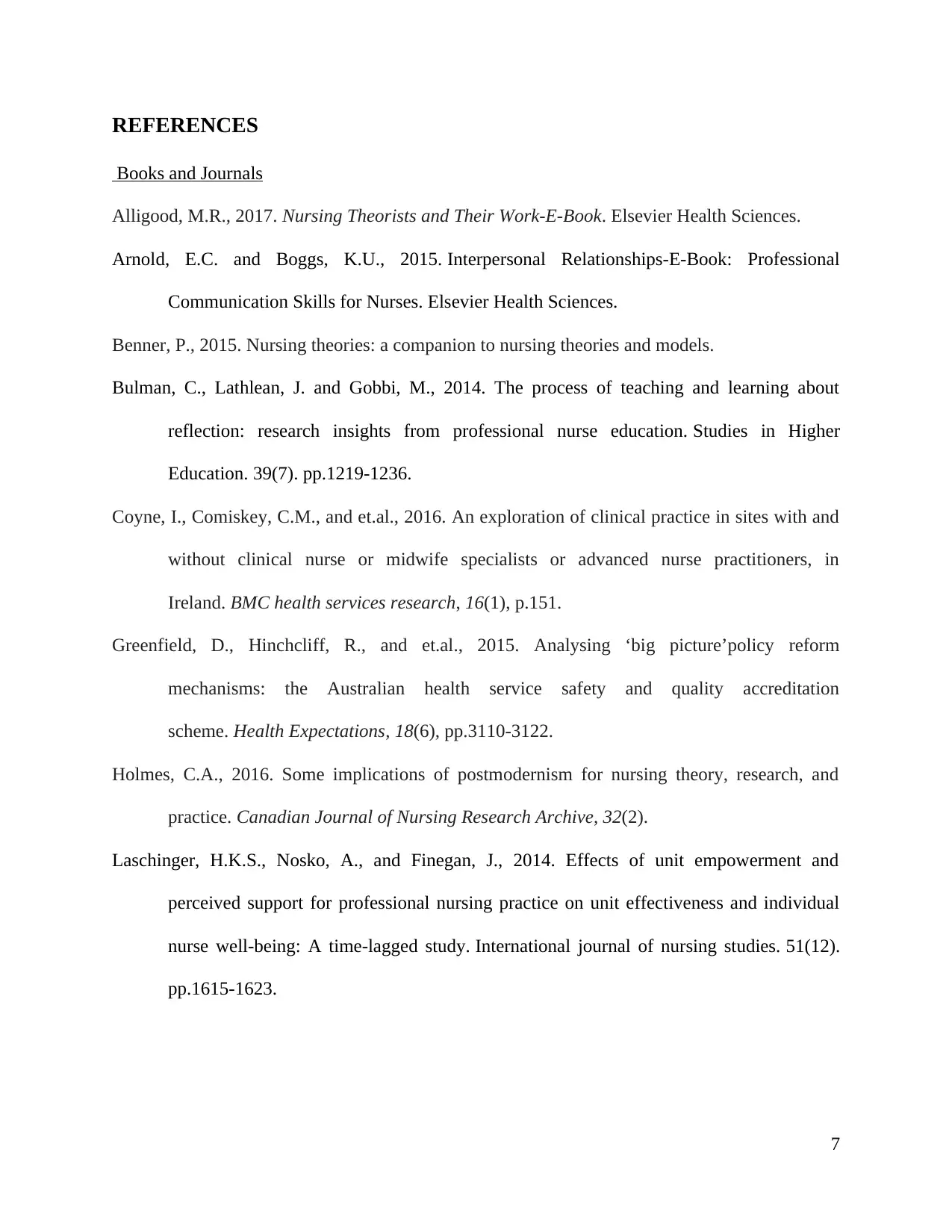
REFERENCES
Books and Journals
Alligood, M.R., 2017. Nursing Theorists and Their Work-E-Book. Elsevier Health Sciences.
Arnold, E.C. and Boggs, K.U., 2015. Interpersonal Relationships-E-Book: Professional
Communication Skills for Nurses. Elsevier Health Sciences.
Benner, P., 2015. Nursing theories: a companion to nursing theories and models.
Bulman, C., Lathlean, J. and Gobbi, M., 2014. The process of teaching and learning about
reflection: research insights from professional nurse education. Studies in Higher
Education. 39(7). pp.1219-1236.
Coyne, I., Comiskey, C.M., and et.al., 2016. An exploration of clinical practice in sites with and
without clinical nurse or midwife specialists or advanced nurse practitioners, in
Ireland. BMC health services research, 16(1), p.151.
Greenfield, D., Hinchcliff, R., and et.al., 2015. Analysing ‘big picture’policy reform
mechanisms: the Australian health service safety and quality accreditation
scheme. Health Expectations, 18(6), pp.3110-3122.
Holmes, C.A., 2016. Some implications of postmodernism for nursing theory, research, and
practice. Canadian Journal of Nursing Research Archive, 32(2).
Laschinger, H.K.S., Nosko, A., and Finegan, J., 2014. Effects of unit empowerment and
perceived support for professional nursing practice on unit effectiveness and individual
nurse well-being: A time-lagged study. International journal of nursing studies. 51(12).
pp.1615-1623.
7
Books and Journals
Alligood, M.R., 2017. Nursing Theorists and Their Work-E-Book. Elsevier Health Sciences.
Arnold, E.C. and Boggs, K.U., 2015. Interpersonal Relationships-E-Book: Professional
Communication Skills for Nurses. Elsevier Health Sciences.
Benner, P., 2015. Nursing theories: a companion to nursing theories and models.
Bulman, C., Lathlean, J. and Gobbi, M., 2014. The process of teaching and learning about
reflection: research insights from professional nurse education. Studies in Higher
Education. 39(7). pp.1219-1236.
Coyne, I., Comiskey, C.M., and et.al., 2016. An exploration of clinical practice in sites with and
without clinical nurse or midwife specialists or advanced nurse practitioners, in
Ireland. BMC health services research, 16(1), p.151.
Greenfield, D., Hinchcliff, R., and et.al., 2015. Analysing ‘big picture’policy reform
mechanisms: the Australian health service safety and quality accreditation
scheme. Health Expectations, 18(6), pp.3110-3122.
Holmes, C.A., 2016. Some implications of postmodernism for nursing theory, research, and
practice. Canadian Journal of Nursing Research Archive, 32(2).
Laschinger, H.K.S., Nosko, A., and Finegan, J., 2014. Effects of unit empowerment and
perceived support for professional nursing practice on unit effectiveness and individual
nurse well-being: A time-lagged study. International journal of nursing studies. 51(12).
pp.1615-1623.
7
⊘ This is a preview!⊘
Do you want full access?
Subscribe today to unlock all pages.

Trusted by 1+ million students worldwide
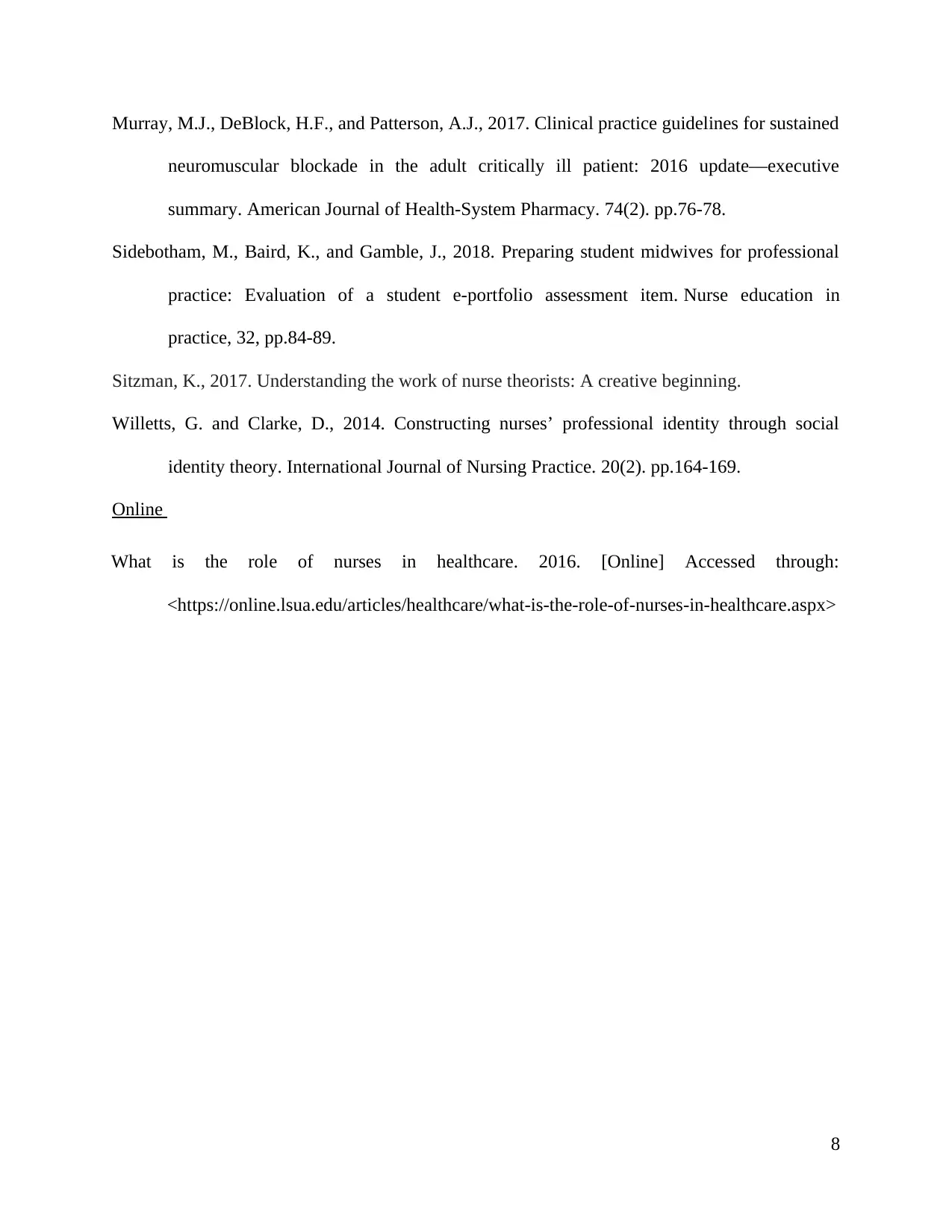
Murray, M.J., DeBlock, H.F., and Patterson, A.J., 2017. Clinical practice guidelines for sustained
neuromuscular blockade in the adult critically ill patient: 2016 update—executive
summary. American Journal of Health-System Pharmacy. 74(2). pp.76-78.
Sidebotham, M., Baird, K., and Gamble, J., 2018. Preparing student midwives for professional
practice: Evaluation of a student e-portfolio assessment item. Nurse education in
practice, 32, pp.84-89.
Sitzman, K., 2017. Understanding the work of nurse theorists: A creative beginning.
Willetts, G. and Clarke, D., 2014. Constructing nurses’ professional identity through social
identity theory. International Journal of Nursing Practice. 20(2). pp.164-169.
Online
What is the role of nurses in healthcare. 2016. [Online] Accessed through:
<https://online.lsua.edu/articles/healthcare/what-is-the-role-of-nurses-in-healthcare.aspx>
8
neuromuscular blockade in the adult critically ill patient: 2016 update—executive
summary. American Journal of Health-System Pharmacy. 74(2). pp.76-78.
Sidebotham, M., Baird, K., and Gamble, J., 2018. Preparing student midwives for professional
practice: Evaluation of a student e-portfolio assessment item. Nurse education in
practice, 32, pp.84-89.
Sitzman, K., 2017. Understanding the work of nurse theorists: A creative beginning.
Willetts, G. and Clarke, D., 2014. Constructing nurses’ professional identity through social
identity theory. International Journal of Nursing Practice. 20(2). pp.164-169.
Online
What is the role of nurses in healthcare. 2016. [Online] Accessed through:
<https://online.lsua.edu/articles/healthcare/what-is-the-role-of-nurses-in-healthcare.aspx>
8
1 out of 10
Related Documents
Your All-in-One AI-Powered Toolkit for Academic Success.
+13062052269
info@desklib.com
Available 24*7 on WhatsApp / Email
![[object Object]](/_next/static/media/star-bottom.7253800d.svg)
Unlock your academic potential
Copyright © 2020–2026 A2Z Services. All Rights Reserved. Developed and managed by ZUCOL.




